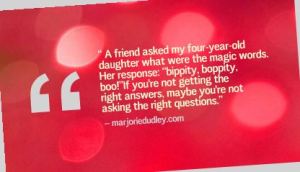 The other day, with a cookie up for grabs, a family friend asked my precocious, four-year-old daughter what were the magic words. My daughter’s response: “bippity, boppity, boo!”
The other day, with a cookie up for grabs, a family friend asked my precocious, four-year-old daughter what were the magic words. My daughter’s response: “bippity, boppity, boo!”
Not only is this a sign we watch too many princess movies, but it illustrates two salient points about human communication. One, the quality of the answers we get is directly proportionate to the quality (and relevance) of the questions we ask. And two, the answers given will largely depend on the perspective of the giver.
Let me talk first about quality. Quality is a funny word. What does it really mean—I mean really mean? I had a marketing professor who would shoot students the stink-eye if one were to refer to a brand as representing “quality”. Why? Because quality means many things to many people.
Quality, as found on Google, means “the standard of something as measured against other things of a similar kind; the degree of excellence of something”.
Well what things? How Similar? How many degrees?
Because we can’t know, and because those value assessments are themselves assigned arbitrary weights, quality, then is arbitrary.
So much for quality questions, right?
Wrong. Because what we do know is that questions like “what can I help you find today” don’t bring a quality response. When someone asks you that at Macy’s or on the car lot what do you respond? Let me guess…wait for it… “Nothing, just looking, thanks”.
Was I close?
Questions that are tired, like the aforementioned; questions that are self-serving like “what would it take to get you into that car today?”; questions that are pushy, insincere or too leading are all the antithesis of quality.
Now that we know what quality isn’t, what could it be? We can start with the opposite; words like unassuming, sincere, mutually beneficial, unattached to the outcome, and truth-seeking are all solid.
But quality questions also sound different. Quality questions are direct. They have no blame or judgment in them. Quality questions have a purpose. Even the tone of a quality question is nurturing (but never patronizing) in nature, especially when discussing difficult, important or sensitive topics.
In the case of the fairy-godmother-incarnate, a better question may have been “how can you ask that using your manners?” In the case of the car lot, it might be “what kind of cars would you consider test-driving this afternoon?” or “you probably aren’t interested in test-driving anything today, are you?” That last one had a little jiu-jitsu thrown in for good measure, but you can see that they are both immediately disarming and different. They ask about the truth and don’t speak in cliché.
And how about perspective? In the car example, what is the prevailing perspective of a driver pulling into a car lot? Typically, it’s one of mistrust with a chaser of “hold-my-cards-close-to-the-vest”. The perspective of the buyer is “I’ve got to get you before you get me” and that paradigm serves no one. While we can’t change how the buyers look at something, we can change what they look at.

It reminds me of this visual to the right: are you showing someone the round end or are you showing them the curved side (which actually appears square)? Are you showing them what you want to show them or what they want to see? Are you asking questions in a way that’s comfortable for you or that works for the other party?
As my daughter is concerned, her experience of “magic words” extends exclusively to Cinderella, so of course she nailed it with her response. Are your clients, coworkers, employees, etc. not giving you the answers you want because they are hearing your words differently based on their unique perspective? Presumably, if you have any friction with any person for any reason, the answer to that question is a resounding ‘yes’.
Knowing you can’t change what they hear, you must change what you say to be relevant and resonant to them. We can debate that “communication is a two-way street” and we would technically be correct. However, I am reminded of my favorite Dr. Phil-ism: “Do you want to be right or do you want to win?”
If winning the effective communication game (i.e.: earning respect, getting what you want—ethically, having followers who follow you by choice, so on and so forth) is your goal, then the onus is really on you to change the picture you are presenting with each and every question you ask.
You see, words really are magic. But as my daughter taught me, which words will depend on who you are asking.
*Warning: No car salesmen were harmed in the writing of this article.
Leave a comment